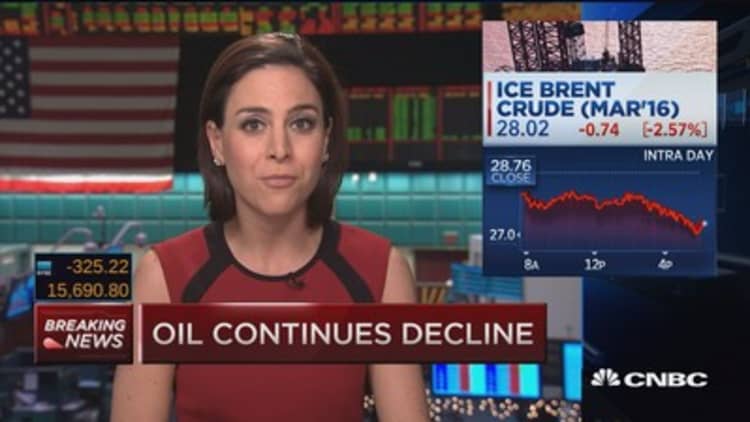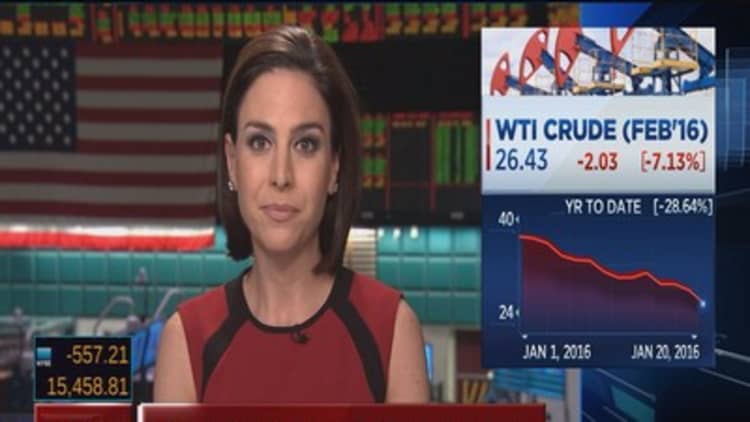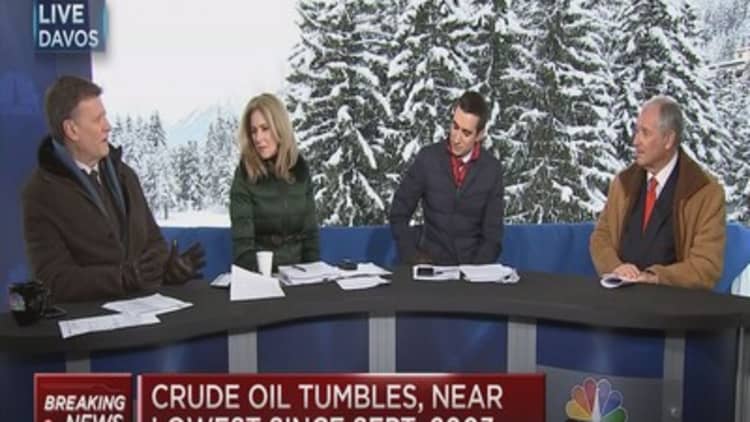



U.S. oil prices crashed below $27 dollars a barrel on Wednesday for the first time since 2003, caught in a broad slump across world financial markets with traders also worried that the crude supply glut could last longer.
Oil has fallen more than 25 percent so far this year, the steepest such slide since the financial crisis, piling more pain on oil drillers and producing nations alike. Yet they keep pumping more oil into an oversupplied market.
Sure enough, fresh data from the American Petroleum Institute on Wednesday showed U.S. crude stocks rose more than expected last week. Crude inventories rose by 4.6 million barrels in the week to Jan. 15 to 485.2 million, well above analysts' expectations for an increase of 2.8 million barrels, the industry group said.
Venezuela requested an emergency OPEC meeting to discuss steps to prop up prices, but other delegates dismissed the idea.
A Middle Eastern shipping firm became one of the first to resume direct business with Iran after international sanctions on Tehran were lifted at the weekend, a reminder of how quickly more oil may flow.
"The Iranians are clearly stepping it up to battle for market share in Europe," said John Kilduff, partner at Again Capital LLC in New York. Not only is that a major market for Saudi Arabia and Russia, but U.S. oil is now flowing unfettered to Europe for the first time, "so it's a battle royale."
U.S. oil recorded its worst settlement since May 2003 on Wednesday, caught in a broad slump across world financial markets with traders also fearful that the crude supply glut could last longer.
U.S. benchmark West Texas Intermediate (WTI) prices for February delivery settled at $26.55 a barrel, down $1.91, or 6.71 percent, up slightly from an intraday low of $26.19, its weakest price since May 2003. The February contract expired Wednesday.
Brent futures fell by 91 cents to $27.87 a barrel, up slightly from a trough of $27.10.
The slide of more than 25 percent in oil prices so far this year has piled more pain on oil drillers and producing nations alike, yet they continue to pump more oil into an oversupplied market.
A Venezuelan request for an emergency OPEC meeting to discuss steps to prop up prices did not stem declines. Other delegates dismissed the idea, and previous requests from Caracas have led nowhere.
"You need the low price to slow down shale much faster," said Bjarne Schieldrop, chief commodities analyst with SEB in Oslo. He added that a "very broad-based sell-off across assets and across the world" amplified pressure on oil prices.
World equities sank to their lowest level since July 2013, and the index's fall so far in January is already 9.9 percent, the biggest drop since 2009.
While the International Monetary Fund's chief economist warned that global financial markets seemed to be over reacting to falling oil prices and the risk of a sharp downturn in China's economy, demand concerns compounded an already bearish energy market.
The International Energy Agency, which advises industrialized countries on energy policy, warned on Tuesday that the world could "drown in oversupply" of oil in 2016, with Iran's exports piling into the excess.
"It's a continuous story that pushes prices lower and lower," said Hans van Cleef, senior energy economist with ABN AMRO. "We should see an effect on production."
Russia's largest private oil producer on Wednesday said it expects the country's output to drop for the first time in many years in 2016.
"Today, the oil industry is near a survival line ... Unfortunately we are cutting drilling," Lukoil's chief executive Vagit Alekperov said.
A report said Canada's oil-sands producers were now losing money on every barrel, while U.S. shale producers "were just burning cash" at current prices.
U.S. commercial crude oil stocks were forecast to have risen by 3 million barrels last week, a Reuters survey taken ahead of weekly inventory data showed on Tuesday. A report on stocks from the American Petroleum Institute, a U.S. industry group, is due later on Wednesday.
Official data from the U.S. government's Energy Information Administration will be out on Thursday, a day late due to a public holiday.
—CNBC's Patti Domm and Tom DiChristopher contributed to this story.




